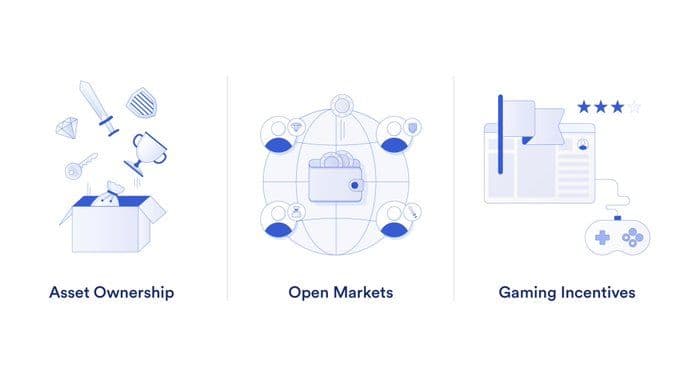In recent years, the intersection of cryptocurrency and gaming has given rise to a transformative wave that is reshaping the landscape of digital entertainment. Cryptocurrencies, with their decentralized and secure nature, are catalyzing innovative solutions within the gaming realm, offering unprecedented opportunities for players, developers, and investors alike.
From the advent of blockchain-based gaming platforms to the integration of non-fungible tokens (NFTs) and decentralized finance (DeFi) in virtual economies, the synergy between crypto and gaming is forging new frontiers. This dynamic fusion not only enhances the user experience by introducing novel gameplay mechanics and ownership structures but also challenges traditional paradigms, opening doors to a more inclusive and decentralized future for the gaming industry.
As these technologies continue to evolve, the impact of crypto on gaming promises to be a paradigm shift that redefines how we perceive and engage with digital entertainment. In this article, we dive into everything you need to know about cryptocurrencies and crypto gaming.

What Are Crypto Games?
Many video games have some form of in-game currency, such as V-bucks in Fortnite and robux in Roblox. However, most games penalize players who sell their in-game currency to others.
In contrast, many web3 games let players earn crypto by completing quests or outperforming other crypto gamers. These players own their crypto gaming assets and are free to sell them to others. These crypto games can pay players and store data because they use blockchain technology and smart contracts.

How Does Crypto Gaming Work?
These games often use non-fungible tokens (NFTs) and cryptocurrency. In most cases, crypto games have specific gaming tokens to reward players. The popular My Neighbor Alice game rewards players with the ALICE token when they participate in events. Players can use the ALICE token to buy in-game assets, NFTs, and avatars.
The blockchain gaming ecosystem relies on a combination of web2 and web3 technology. Gaming environments are typically stored on centralized servers, as is some or all player data. Distributed ledgers are used to store crypto gaming coins and NFTs representing virtual items.
Play-to-earn games incentivize players to participate by rewarding them with cryptocurrency and NFTs. The play-to-earn model bridges the gap between playing for fun and profit, because the players’ rewards have real-world value and can be sold on the secondary market.

Benefits of Crypto Gaming?
Since the inception of cryptocurrency, the gaming world has become infinitely more intriguing. Here are several ways in which cryptocurrency is catalyzing a revolution in the gaming industry:
(1) Ownership of In-Game Assets
Traditionally, many in-game assets lacked real-world value, often rendering them seemingly useless to players beyond the confines of the game. The introduction of cryptocurrency, notably through Non-Fungible Tokens (NFTs), transforms these assets into transferable entities. This not only increases player engagement but also provides an immersive gaming experience.
(2) Enhanced Security and Transparency
Blockchain technology emerges as a game-changer by bolstering security and transparency in the gaming industry. Just as online payments have become more secure and transparent through blockchain implementation, the same principles apply to gaming. Blockchain's robustness proves superior to traditional methods, significantly reducing fraud and enabling the tracking of in-game asset ownership.
(3) Decentralized Development in Gaming
Decentralized development marks a departure from the traditional lengthy game development processes. Blockchain technology empowers developers and players to collaboratively work on a game in real-time. This decentralized approach allows players insight into the management of the game economy and a voice in the development process, fostering the creation of more player-centric games.
(4) Play-To-Earn Models
Blockchain technology facilitates various play-to-earn models, with more in development. Players can now enjoy gaming and earn simultaneously, either in the form of in-game assets or cryptocurrency. This paradigm shift is advantageous for players, eliminating the need to pay for playing and transforming gaming into a potential source of income.
(5) Elevated Gaming Experience
In summary, the transformative impact of cryptocurrency on the gaming industry is evident. By providing a superior gaming experience, an additional income stream, and other benefits, cryptocurrency enhances the overall gaming landscape for players.

Examples of Crypto Games
Popular Crypto Integrations in Games
While the integration of cryptocurrency and gaming is in its nascent stages, notable advancements are visible. Here are a few examples illustrating how cryptocurrency is employed in the gaming industry:
Axie Infinity: A strategy game by Sky Mavis on the Ronin blockchain. The game is centered around unique digital pets known as Axies. Players engage in buying, breeding, and battling Axies, earning the game's native currency, $SLP. The key distinction lies in the ownership of in-game assets; thanks to blockchain, players have full control over their Axies and can freely trade them on open marketplaces.

Gods Unchained: A collectible trading card game (TCG) by Immutable on the Ethereum blockchain. Here, cards of varying rarities can be openly bought, sold, and traded as NFTs. Players not only build their preferred decks but also earn $GODS tokens by playing and winning games. These tokens can be used to purchase new card packs or contribute to the in-game governance mechanism.

Sorare: A fantasy sports game built in-house by Sorare on the Ethereum blockchain. Sorare merges fantasy sports with blockchain, allowing players to collect NFT player cards and enter tournaments based on real-life player performance. Points are earned for the in-game lineup's performance, as well as the rarity of the cards. The auction-style format for new card sales and tournament rewards further solidifies the link between in-game assets and real-world value.

While it remains premature to definitively declare cryptocurrency as the "future of the gaming industry", current indications suggest that it has already sparked a revolution and may play a pivotal role in shaping the industry's future.
Cryptocurrency's integration into gaming has the potential to make the industry more engaging and beneficial for players worldwide. As the gaming future unfolds, it is intriguing to observe how cryptocurrency will continue to shape the industry in the years to come.
Final Thoughts
Undoubtedly, cryptocurrency has left an indelible mark on the gaming industry, opening up new opportunities and business models for developers and gamers alike. The amalgamation of cryptocurrency and blockchain technology has injected an extra layer of interest, immersion, and enjoyment into the gaming experience, offering enhanced transparency and security to players. The future of the gaming industry appears poised for a transformative journey, guided by the influence of cryptocurrency.
This article was inspired by an original blog post from Chainlink, you can read the full post on their website here for more information.






